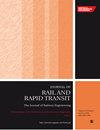The design of electronically controlled pneumatic brake signal propagation mode for electronic control braking of a 30,000-ton heavy-haul train
IF 1.7
4区 工程技术
Q3 ENGINEERING, CIVIL
Proceedings of the Institution of Mechanical Engineers Part F-Journal of Rail and Rapid Transit
Pub Date : 2023-08-18
DOI:10.1177/09544097231196286
引用次数: 0
Abstract
This paper takes 30,000-ton heavy-haul trains as the research object, and studies the propagation characteristics, train braking ability and longitudinal impulse level of three ECP electronic control signal Propagation modes of segmented electro-pneumatic braking under different lag times. The difference between the train’s use of segmented electro-pneumatic braking and air braking in the long ramp operation method is compared. The results show that the best way is when the leading control locomotive sends the ECP signal backward and the slave control locomotive sends the ECP signal both forward and backward. Compared with the worst mode that only the leading control locomotive propagates the ECP signal backward, the coupler force can be reduced by 46.5%, the time difference between the slowest and fastest action vehicles can be reduced by 60.5%, and the emergency braking distance can be reduced by 1.2%. With the increase in the lag time of the slave control locomotive, the differences in the braking capacity and longitudinal impulse level of the three ECP electronic control signal propagation modes decrease. The effectiveness of the slave control locomotive’s ability to send ECP signals is closely related to the lag time of the leading and slave control locomotives. Compared with pure air braking, segmented electro-pneumatic braking can delay the braking times of the last two brakes by 32.6 s and 83.7 s,respectively, during the three-cycle braking, and the starting time of relief can be delayed by 12.7 s, 89.8 s and 16.9 s respectively, and the maximum coupler force can be reduced by 30.1%. The research work of this paper can provide reference for the formulation of electro-pneumatic braking scheme of 30,000-tons heavy-haul train.3万吨重载列车电控制动电控气动制动信号传播模式设计
本文以3万吨重载列车为研究对象,研究了不同滞后时间下分段电气制动三种ECP电控信号传播方式的传播特性、列车制动能力和纵向冲击水平。比较了列车在长坡道运行方式中采用分段电气制动与空气制动的区别。结果表明,最佳的控制方式是由主控制机车向后发送ECP信号,从控制机车向前后发送ECP信号。与仅由前导控制机车反向传播ECP信号的最坏模式相比,联轴器力可减小46.5%,最慢与最快行动车辆时间差可减小60.5%,紧急制动距离可减小1.2%。随着从控机车滞后时间的增加,三种ECP电控信号传播方式的制动能力和纵冲水平差异减小。从控机车发送ECP信号能力的有效性与主从控机车的滞后时间密切相关。与纯空气制动相比,分段电气制动在三循环制动过程中,可使后两个制动器的制动时间分别延迟32.6 s和83.7 s,卸压启动时间分别延迟12.7 s、89.8 s和16.9 s,最大耦合器力降低30.1%。本文的研究工作可为3万吨重载列车电气制动方案的制定提供参考。
本文章由计算机程序翻译,如有差异,请以英文原文为准。
求助全文
约1分钟内获得全文
求助全文
来源期刊

CiteScore
4.80
自引率
10.00%
发文量
91
审稿时长
7 months
期刊介绍:
The Journal of Rail and Rapid Transit is devoted to engineering in its widest interpretation applicable to rail and rapid transit. The Journal aims to promote sharing of technical knowledge, ideas and experience between engineers and researchers working in the railway field.
 求助内容:
求助内容: 应助结果提醒方式:
应助结果提醒方式:


